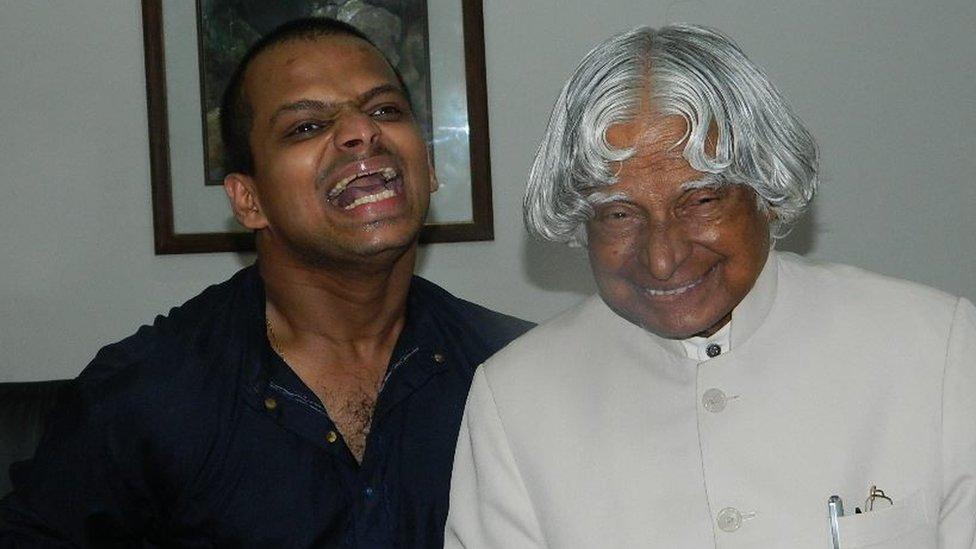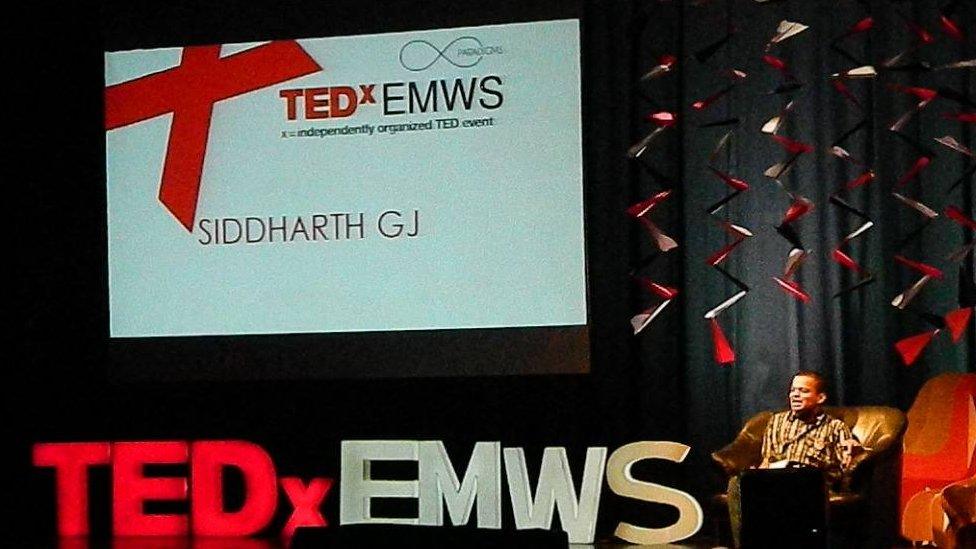A man with cerebral palsy tells the story of meeting APJ Abdul Kalam
- Published

Siddharth Jaykumar (left) says Dr Kalam "taught him to be a good human being"
Former Indian president APJ Abdul Kalam died on Monday at the age of 83. He was known for his humble and friendly nature and touched many lives during his illustrious career. BBC Monitoring's Vikas Pandey speaks to Siddharth Jaykumar, whose life changed after meeting the former president.
Mr Jaykumar still remembers every detail of his first meeting with Dr Kalam on 2 December, 2005.
The president had written to him after reading his story of "grit and determination" in an article on web portal Rediff.com., external
Mr Jayakumar has cerebral palsy, but he overcame the odds to get a degree in economics and become an executive in a private bank.
Dr Kalam, who was the president at the time, was impressed with his story and wanted to meet him.
Start of friendship
The banking executive vividly remembers how he was mesmerised with Dr Kalam's humble nature when they met for the first time in the southern Indian city of Chennai (Madras).
"I did not feel even for a second that I was meeting the president of India. He told me he was proud of what I had achieved. He encouraged me to continue doing well in life," Mr Jaykumar says.
That was the start of a "friendship" that lasted for more than a decade.
"I really don't know what to say. All the memories of the times spent with him are coming back to my mind and heart," he says.
The 35-year-old still remembers that he was surprised and amazed when Dr Kalam shared his story, external with the world in a speech on the International Day for Persons with Disabilities in December 2005.
The two interacted several times after their first meeting, but Mr Jaykumar fondly remembers one "unplanned encounter" three years ago.
"I had gone to listen to him at an event in Chennai. He recognised me from the stage and broke the protocol to come and meet me in the crowd," he remembers.
He adds that the incident explains why people loved him so much, earning him the unofficial title of the "people's president".
'Great human being'
He broke protocols to meet people, specially children, wherever he went and always wore his infectious smile.
This was in stark contrast with most Indian politicians who usually follow strict rules and stay behind layers of security.
He is also known as India's "missile man" for his contributions to the country's satellite programmes, guided and ballistic missile projects and nuclear weapons programme.
He loved sharing his experiences and knowledge with young minds through his books and speeches.
And that is what he did until his last moments. He suffered a cardiac arrest while giving a lecture at a management institute in Shillong, Meghalaya.
He inspired a generation of Indians and Mr Jaykumar feels proud that he knew him personally.
"He was a beautiful human being. He inspired me to share my experiences with the world," he says.
Mr Jaykumar suffered great difficulties in his childhood. Doctors had "diagnosed him as mentally retarded".
He also faced problems in getting admissions at schools and colleges. But he says he loves winning against difficult situations.
Dr Kalam too liked this quality and encouraged him to study further and inspire others.
Mr Jaykumar today is a well-known motivational speaker, but he never forgets to thank Dr Kalam.

Mr Jaykumar has given more than 130 motivational talks in different parts of the country
"I always mention him and his stories in my talks. I became a better human being after meeting him. I also became more visible after he mentioned my story in his speech in 2005," he says.
He adds that Dr Kalam taught him a valuable lesson in life that "no matter who you are, you must be a good human being above everything else".
Mr Jaykumar says that he will now honour "his friend's" wish and write a book.
"I think I will definitely write a motivational book in honour of a great president, a great scientist, but above all, a great human being and a friend," he says.
The banking executive adds that he still takes refuge in Dr Kalam's teaching whenever he faces difficult situations.
"He changed my life in so many ways. Professional success aside, I give him more than 100% credit for making me the person I am today. He taught me to dream," he says.
Many agree that Dr Kalam's legacy lies in the people he inspired and nurtured.
It's hardly surprising that there are many like Mr Jaykumar who are feeling that "one of their own" has died.
BBC Monitoring reports and analyses news from TV, radio, web and print media around the world. You can follow BBC Monitoring on Twitter, external and Facebook, external.